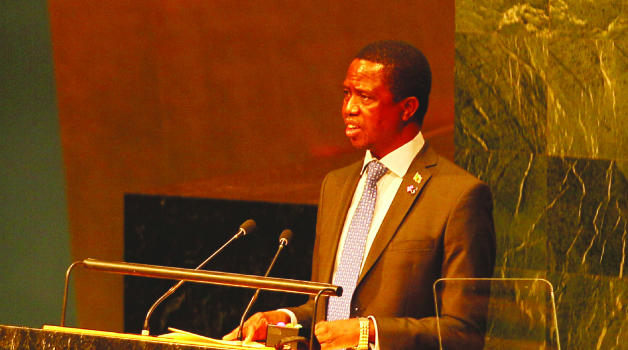
•PRESIDENT Edgar Lungu addresses delegates during the 70th United Nations (UN) General Assembly at the UN headquarters in New York, United States, at the weekend. Picture by SALIM HENRY/STATE HOUSE
From PERPETUAL SICHIKWENKWE in New York –
PRESIDENT Edgar Lungu has said global Gross Domestic Product (GDP) has had minimal effect in reducing poverty levels, improving people’s livelihood and facilitating access to economic and social opportunities in many countries.
Mr Lungu said this here during the United Nations (UN) Summit on the adoption of the Post-2015 Development Agenda held under the theme ‘Operationalisation of the 2030 Agenda for Africa’s Industrialisation’.
The President said although the African continent had recorded higher GDP growth rates and a significant increase in total trade, unemployment levels remained high, especially among the youth and young women.
Mr Lungu said Africa was a continent that had been characterised by poverty with almost half its population earning below US$1.25 per day.
Zambia is among 34 countries in Africa that are classified as Least Developed Countries (LDCs).
Mr Lungu said although Zambia was an LDC, it had also been classified as a lower middle-income country as the country had sustained a steady GDP and growth in trade over the last decade.
“Despite the strides that have been made in economic growth and expanded trade, the major share of its exports are raw materials. As a result, this growth has not been sufficient to significantly reduce poverty and unemployment levels in the country which remain high, especially among women and the youth,” he said.
Mr Lungu said that unemployment levels were also in part as a result of the economic growth being propelled mostly by exports of raw commodity products rather than value-added ones.
He said the weak manufacturing base in most LDCs did not allow for local value-addition and, as a result, jobs that should be in the country with the natural resource were being exported to countries that had the capacity to add value.
President Lungu said industrialisation was indispensable for countries to achieve sustained and sustainable economic growth that was also socially inclusive and environmentally sound.
“It is, therefore, an inevitable solution to bring about the much-needed structural economic transformation,” he said.
The President said that industrialisation-induced structural economic transformation would help countries to diversity their economies, raise productivity, create better jobs and increase their competitiveness in the global market.
Meanwhile, Mr Lungu said the spirit of South-South and triangular cooperation continued to soar.
This was evident in the fact that in the last few years, several developments had taken place in the countries of the South and the North.
Mr Lungu said this when he gave an intervention statement at the high-level roundtable meeting on South-South cooperation, at the ongoing 70th United Nations General Assembly in New York at the weekend.
He said the rising standards of living of the peoples of the South had created challenges and opportunities for enhancing development among the UN countries.
Mr Lungu said emerging economic powerhouses of the South would play a catalytic role in uplifting the economic fortunes of the regions.
“Further, South-South cooperation must result in increased foreign direct investments among countries of the South particularly among the least developed countries and land-locked developing countries which will result in value-addition, industrialisation, job creation as well as women and youth empowerment,” he said.
Mr Lungu said that Zambia, like the upper middle-income countries of the South, had witnessed a growing demand for better health services, especially with the growing middle-class population.






